In the "Closing Session", Dr. Miyoko O. Watanabe, Director-General Center for Science Communication, Japan Science and Technology Agency (JST) reported Science Agora's performance in 2015, followed by this year’s institutional awards ceremony by Executive Director Yoshiaki Ando of JST and representatives from each institution. Speakers discussed the future of Science Agora in Dr. Watanabe’s reflection for the past ten years and the panel discussion by Japanese and international scholars. They also presented themes to share with the future Science Agora participants to spread the Science Agora activities to the rest of the country starting next year (2016).
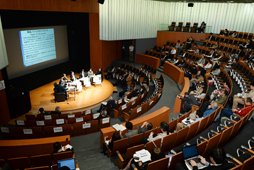
まず最初に、科学技術振興機構科学コミュニケーションセンターセンター長の渡辺氏が今年のサイエンスアゴラを総括しました。
First, Dr. Miyoko O. Watanabe, Director-General Center for Science Communication, Japan Science and Technology Agency (JST) summarized Science Agora this year.
今年は、「『ひかり』を通して見る人類の歩みと未来 ~原始から原子まで~」「サイバー社会とは何か?」「2020年の社会をつくる ~第5期科学技術基本計画の目指すもの~」という3つのテーマに沿った形での参加を募った経緯を説明。「『ひかり』を通して見る人類の歩みと未来」は28件、「サイバー社会とは何か?」は9件、「2020年の社会をつくる」は66件、その他として91件の応募があり、結果として、全194件のイベントが行われ、そのうちセッションは67件、ブースは127件だったと報告しました。
She explained that they called for participants for the following three themes; "The progress and the future of human through 'light' - From origins to atoms," "What is cyber society?", and "Creating the society of 2020 - What we are hoping to achieve in the 5th Scientific Technology Basic Project". 28 applied for "The progress and the future of human through 'light'", 9 for "What is cyber society?", 66 for "Creating the society of 2020", and 91 for others. As a result, total 194 events were held, and of 194, 67 were sessions, and 127 were exhibitions.
続いて行われたサイエンスアゴラ賞授賞式では、全194件のイベントの中からサイエンスアゴラの趣旨に合致した企画が選ばれ、表彰されました。「JST賞」はトークセッション「オープンサイエンス革命~オンラインコラボレーションによる研究推進の可能性~」を企画したクラウドファンディングサイトのアカデミストが受賞。「日本科学未来館賞」は、「なぞときiPS細胞」を出展した京都大学iPS細胞研究所に決まりました。このほか、「産総研賞」(「SSH高校生ディベート『遺伝子組換え食品は安全か』」岐阜県立岐阜農林高等学校)、「日本学生支援機構東京国際交流館賞」(「ヨーロッパライトハウス」駐日欧州連合代表部)、「フジテレビ賞」(どきどきわくわく! 科学工作をつくってあそぼう!」東京工業大学公認サークル 東工大ScienceTechno)、「リスーピア賞」(「図形と空間の不思議 ~敷き詰め模様で遊ぼう!~」日本テセレーションデザイン協会)、「KADOKAWA賞」(「サイエンス・エンジェルと語る理系女子の現在過去未来」東北大学 サイエンス・エンジェル)が、それぞれ授与されました。
The next event was Science Agora Award Ceremony, in which they picked and awarded projects from all 194 events that fit to what Science Agora aimed to achieve. A crowd funding website, Academist won "JST Award" for the talk session "Open Science Revolution - The possibility of propelling studies by collaborating online". iPS cell laboratory won "National Museum of Emerging Science and Innovation Award" for the exhibition "Riddle me iPS cells". Furthermore, Gifu Prefectural Gifu Agriculture and Forestry High School won "National Institute of Advanced Industrial Science and Technology" for SSH high schooler debate "Is GM food safe?", European Union representatives in Japan won "Japan Student Services Organization Tokyo International Exchange Center Award" for "European Lighthouse", Tokyo Institute of Technology Official Club Tokodai Science Techno won "Fuji TV Award" for "Dokidoki Wakuwaku! Let's play with science crafts!", Japan Tessellation Design Committee won "RiSuPia Award" for “The mystery of shapes and space – Let’s play with paving patterns!, and Tohoku University Science Angels won "Kadokawa Award" for "Let's talk about the past, the present, and the future of Scientific Girls with Science Angels".
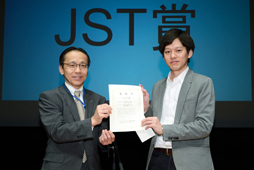
授賞式の後、渡辺氏が再び登壇し、サイエンスアゴラのこれまでの実績とこれからの展望を語りました。サイエンスアゴラは科学と社会をつなぐ方法を考え、それを実現するために2006年に始まり、今年の開催で10回目となりました。渡辺氏は、「参加者の割合について、昨年は、学生、研究者・企業、政策担当者・メディアなどがそれぞれ3分の1ずつになり、さまざまな方が参加していただけるようになりました」と評価した一方、「大学研究機関の参加が少ないので、どのようにすればもっと多く参加してもらえるのかが課題」と述べました。その上で今後、「どのような方に来ていただきたいのか、また、来ていただけるのかを考え、取り組んでいかなければならない」と、さらなる発展に向け決意を新たにしました。
After the awards ceremony, Dr. Watanabe returned to the podium to share the achievements and the future prospects of Science. This was the tenth Science Agora since its inception in 2006 when it began as a place to link science and the society. Dr. Watanabe made a positive remark: "There is a broad range of participants; students, researchers/companies, and policymakers/media each consist of a third of participants since last year." However, on the other hand, she said, "We are looking for more involvements from academic research institutes." With that in mind, she shared, "Science Agora must see its future with the kinds of engagements that we will have and hope for."
さらに、「日本の中だけでの閉じたものではなく、世界とつながるサイエンスアゴラを目指します」と宣言。昨年のキーノートセッションは全てJSTが企画したものだったが、今年は一般応募による企画もあったと紹介し、JSTだけで行うのではなく、みんなで作って行くサイエンスアゴラという方向性も打ち出しました。。
"We want to make Science Agora as a global platform that is not limited in Japan," Dr. Watanabe added. JST planned all the Keynote Sessions last year, some of this year’s events were planned by the outside applicants. Rather than limiting itself to JST, Science Agora would become an inclusive platform.
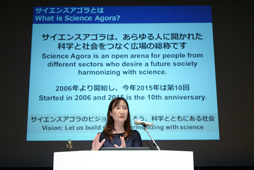
続いて渡辺氏は、2016年に関心が持たれる出来事として「マイナンバー」「TPP」「リオデジャネイロオリンピック」「震災復興から5年」などを挙げ、これらを反映した次回のサイエンスアゴラのテーマとして、以下の3つを掲げました。
Dr. Watanabe brought up “My Number Policy”, “TPP”, “Rio de Janeiro Olympics”, and “Recovery from the Great East Japan Earthquake five years after” as examples of events that would generate public interests in 2016. She presented the following three as the next Science Agora’s theme.
1.「先端科学が生み出す新しい医、食、くらし」
1. New medical care, food, and life that will be created by advanced science
2.「教育・文化芸術・スポーツと科学との協働」
2. Collaboration between education, culture, art, and sports, and science
3.「震災復興5年に学ぶこれからの科学の役割」
3. The future role of science learned from the 5 years of the 3.11 disaster reconstruction
以上のテーマについて識者の方々に意見を聞かせていただきたいと述べ、次のディスカッションにつなげました。
She mentioned that she would ask for opinions from the experts on these themes, and led the next
渡辺氏の説明を受け、今後のサイエンスアゴラに必要なものは何か、どんなサイエンスアゴラにしていくべきかについて、パネルディスカッションが展開されました。司会は科学技術振興機構上席フェローの大竹暁氏が務めました。
After an opening remark by Dr. Watanabe, a panel discussion took place to discuss the future visions for Science Agora and what it would need to achieve the vision. It was moderated by Mr. Satoru Ohtake, Principal Fellow of Japan Science and Technology Agency (JST).
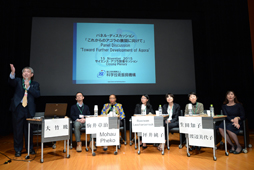
「対話型のサイエンスアゴラにするべき。科学を支えているのが社会の人々なので、対話をしてつながることが大切です」と語ったのは、奈良先端科学技術大学院大学准教授で日本学術会議若手アカデミー委員会前委員長・会長アドバイザーの駒井章治氏。来年のテーマについては大筋で賛成としつつも「テーマが3つだと目標がぼやけてしまいそうな気がするので、一つに絞るべきではないでしょうか。国際的視点と地方を巻き込むことも検討いただきたい。また、イベント運営やキャッチーコピーなどの専門家を交えてつくっていくべきです」と提言しました。
"Science Agora should be more interactive. People that make up society are at the base of science. Dialogues can help create more links," said Dr. Shoji Komai, Associate Professor at Nara Institute of Science and Technology, and Immediate Former Chairperson of National Young Academy of Japan and Presidential Advisor of Science Council of Japan”. He agreed with the general idea of this year's theme, but suggested, "Having three themes may defocus the objective. It should be narrowed down to one theme. We must consider taking on an international perspective and becoming inclusive of the regional areas in Japan. I also recommend consulting with experts to create an effective slogan."
南アフリカ共和国大使館特命全権大使のモハウ・ペコ氏は、世界とつながるサイエンスアゴラについて、「もっとグローバルな視点を持って話し合うことが重要です。2020年の東京オリンピックに向けてディスカッションを重ねれば、きっと可能だと思います」と発言。また、サイエンスアゴラが担うべき役割について「日本では貧困問題はあまり関係ないかもしれませんが、日本の最先端の科学が、世界の貧困の解決策になるかもしれません。サイエンスアゴラがそういった問題を話し合う場になれば」と、大いに期待していることを強調しました。
To achieve a Science Agora that would create a global link, Dr. Mohau Pheko, South Africa's Ambassador to Japan, stated, "It has to have a global perspective. More discussions for the 2020 Tokyo Olympics could result in having a global perspective." She also commented on the role of Science Agora: "Japan may not have issues of poverty, but leading Japanese technologies may become a solution to poverty in the other parts of the world. That is if Science Agora creates a platform to take up those issues." Dr. Pheko expressed her confidence in the future of Science Agora.
タイ国立ナノテクノロジー研究センター研究員のラウィワン・ラオチャロエンスク氏は「『ジュラシック・パーク』などの映画では、科学者が暴走して勝手なことを行う描写があります。一般的に科学者はそういうものと認識されている節があるので、まずは科学者と社会の関わりを考え、正しく認識してもらうことが大切。サイエンスアゴラは格好の場だと思います」と、サイエンスアゴラの理念のさらなる浸透に期待。大学研究機関の参加拡大については、「学生はもちろんですが、私は科学者の関与を増やすことも必要だと考えます。小さなグループ単位であっても、科学者が集まり、社会問題にどのように関与できるのかを話し合うだけでも素晴らしいと思います」と述べました。
Dr. Rawiwan Laocharoensuk, Researcher of Thailand National Nanotechnology Center, shared her support for the principle of Science Agora, "In movies like “Jurassic Park,” there are scenes where scientists perform experiments to serve their own purpose. And that is how some of the general public sees scientists. It is important to gain public understanding regarding how science and society are linked. Science Agora is a perfect place for that." When discussing on further involvement from the academic research institutions, he stated, "It's necessary to have student involvement, but I think that scientist participation is also essential. Having even a small group of scientist gather and discuss how they can intervene social issues is quite significant in my opinion."
キリン株式会社執行役員の坪井氏は、「企業としての活動はCSR(社会的責任)からCSV(共有価値の創造)に変わってきています。科学も、社会にとって責任のあるCSRから一歩進んで、社会にとって価値を創造することが大事であるという流れに変化しています」と、企業の視点から提言。来年のテーマについては、「社会と科学の関わりをストーリー化することが良いと思います。パラリンピックを例に出すと、医療・科学・スポーツなどのテーマが一つのストーリーとしてまとまります。そうすることで、企業側がどのように関わることができるのかを積極的に考えることができます」と述べました。
"Company initiatives are shifting from CSR (Corporate Social Responsibility) to CSV (Creating Shared Value). The field of science is also moving from CSR, having a social responsibility, to placing importance on creating shared values," Ms. Junko Tsuboi, Executive Member of Kirin Company, spoke from a corporate perspective. She also shared her views on next year's theme: "It is better to incorporate the links between society and science in a bigger picture. For example, the Paralympic Games can combine medicine, science, sports, and other themes in one story. This helps companies to consider how they can get involved."
文部科学省大臣官房政策課対話型政策形成室長の生田知子氏は、「テーマに関しては専門家以外にも響くようなテーマ設定をするべきだと思います。結論ありきではなく、自由に参加することができるテーマである必要があります。自由のないところにイノベーションはありません。イノベーションのないところに未来はありません」と熱弁。
Ms.Tomoko Ikuta, Director of Office for Interactive Policy Making, Ministry of Education, Culture, Sports, Science and Technology (MEXT), shared her thoughts: "The theme has to spark the interests of the public besides experts. Anyone should be able to freely participate beyond just discussions. There is no future without innovation."
会場からは「子供の参加を意識することが一番良い。東京以外でサイエンスアゴラを開催するというのも一つの手だと思います」といった意見などが上がりました。
Feedbacks from the audience included the following: "It is best to encourage children’s participation. Another idea is to hold Science Agora in places other than Tokyo."
そして、ユーロサイエンス事務局長のピーター・ティンデマンス氏は「サイエンスアゴラを単発で開催するのではなく、継続的に開催することが大切です。日本全国でサイエンスカフェを作るということもやってみてはいかがでしょうか」と述べました。
Dr. Peter Tindemans, Secretary General of Euroscience, stated, "Holding annual sessions of Science Agora is not enough. Discussions should be continuous. How about creating Science Cafes all over Japan?"
渡辺氏と司会の大竹氏が、今回上がった意見や課題をJST内で議論して、来年以降のサイエンスアゴラに生かしていきたいと話し、ディスカッションを締めくくりました。
To conclude the discussion, Dr. Watanabe and moderator Mr. Ohtake spoke about bringing the opinions and problems that came up in this discussion back to the JST and applying feedbacks to the future Science Agora.
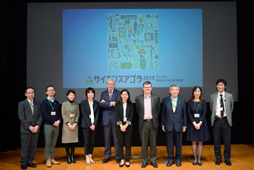
社会的課題は、科学者だけではなく一般の人も議論に加わることの重要性を実感しました。お互いの立場の違いから問題が見えにくくなってしまうこともあるように思います。これを解決するために、科学者と社会が一丸となって意見を交換することで、より良い社会の実現を進めていくことができるのだと思いました。(須藤渉)
I realized the significance of the public involvement in discussing social issues rather than doing so just among scientists. However, different perspectives might make it harder to understand the issues. To solve that problem, it is essential for the scientists and the society to exchange ideas and opinions to create a better society. (Wataru Sudo)